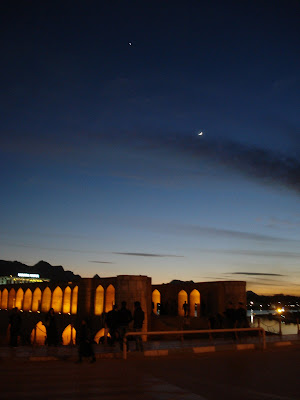Dialogue
The critical remarks on Islam made by Pope Benedict XVI on the occasion of his Regensburg lecture on September 12, 2006 seem to lead eventually to dialogue. The Pope received last week a delegation of Shi’a clerics from the Islamic Republic of Iran in the Vatican.
The inter-religious study theme tied in with the main topic of Benedict’s lecture, Faith and Reason in Christianity and Islam.
The delegates agreed upon the following:
1. "Faith and reason are both gifts of God to mankind."
2. "Faith and reason do not contradict each other, but faith might in some cases be above reason, but never against it."
3. "Faith and reason are intrinsically non-violent. Neither reason nor faith should be used for violence; unfortunately, both of them have been sometimes misused to perpetrate violence. In any case, these events cannot question either reason or faith."
4. "Both sides agreed to further co-operate in order to promote genuine religiosity, in particular spirituality, to encourage respect for symbols considered to be sacred and to promote moral values."
5. "Christians and Muslims should go beyond tolerance, accepting differences, while remaining aware of commonalties and thanking God for them. They are called to mutual respect, thereby condemning derision of religious beliefs."
6. "Generalization should be avoided when speaking of religions. Differences of confessions with Christianity and Islam, diversity of historical contexts are important factors to be considered."
7. "Religious traditions cannot be judged on the basis of a single verse or a passage present in their respective holy Books. A holistic vision as well as an adequate hermeneutical method is necessary for a fair understanding of them".
There was admonition, of course, in the run-up of the meeting. As a matter of fact, the Vatican is largely separated from global politics. The Holy Father has recently read the riot act to G. W. Bush on his visit of the US. But will it help? The discussions with Shi’a clerics may, at a first glimpse, have a mere religious motivation. It is remarkable, however, that the dialogue starts with the second largest branch of Islam, a faith that shares some faint similarities with beliefs saved and promoted by the Roman Catholic Church. The Islamic Republic of Iran, which mainly represents this sect, pursues right now very active foreign politics to the dismay of th US, be it with India, Pakistan, Iraq, or now the Vatican. It is hoped that the (religious) dialogue will go on and soon include also representatives of the other branches. Especially, clerics of Islam’s homeland, Saudi Arabia, have to be involved.
At least, Custodian of the Two Holy Mosques, King Abdullah, had already been received by the Pontiff last November.
The inter-religious study theme tied in with the main topic of Benedict’s lecture, Faith and Reason in Christianity and Islam.
The delegates agreed upon the following:
1. "Faith and reason are both gifts of God to mankind."
2. "Faith and reason do not contradict each other, but faith might in some cases be above reason, but never against it."
3. "Faith and reason are intrinsically non-violent. Neither reason nor faith should be used for violence; unfortunately, both of them have been sometimes misused to perpetrate violence. In any case, these events cannot question either reason or faith."
4. "Both sides agreed to further co-operate in order to promote genuine religiosity, in particular spirituality, to encourage respect for symbols considered to be sacred and to promote moral values."
5. "Christians and Muslims should go beyond tolerance, accepting differences, while remaining aware of commonalties and thanking God for them. They are called to mutual respect, thereby condemning derision of religious beliefs."
6. "Generalization should be avoided when speaking of religions. Differences of confessions with Christianity and Islam, diversity of historical contexts are important factors to be considered."
7. "Religious traditions cannot be judged on the basis of a single verse or a passage present in their respective holy Books. A holistic vision as well as an adequate hermeneutical method is necessary for a fair understanding of them".
There was admonition, of course, in the run-up of the meeting. As a matter of fact, the Vatican is largely separated from global politics. The Holy Father has recently read the riot act to G. W. Bush on his visit of the US. But will it help? The discussions with Shi’a clerics may, at a first glimpse, have a mere religious motivation. It is remarkable, however, that the dialogue starts with the second largest branch of Islam, a faith that shares some faint similarities with beliefs saved and promoted by the Roman Catholic Church. The Islamic Republic of Iran, which mainly represents this sect, pursues right now very active foreign politics to the dismay of th US, be it with India, Pakistan, Iraq, or now the Vatican. It is hoped that the (religious) dialogue will go on and soon include also representatives of the other branches. Especially, clerics of Islam’s homeland, Saudi Arabia, have to be involved.
At least, Custodian of the Two Holy Mosques, King Abdullah, had already been received by the Pontiff last November.



Comments